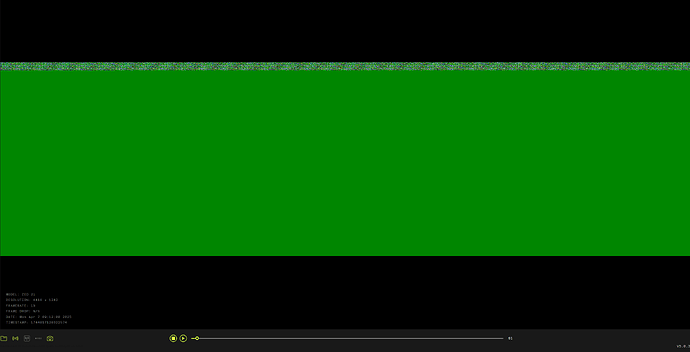Hello.
I have a particular use case where I collect videos with lossless compression and then, to save space when storing, I might want to compress them with lossy compression. For this I run a script which takes a video as input and re-records it (code at the end).
This used to work for ZED 2i with sdk 4 but I am not being able to make it work for ZED X in sdk 5. To try to understand whether it is a camera problem or an SDK problem, I tried to use a video filmed with ZED 2i and I couldn’t do it either. So I think it’s an sdk5 problem.
Below is the code and a frame from the resulting compressed video which is nothing more than a sequence of green frames. I’m currently using SDK5.0.5
Here’s the code I am using
import pyzed.sl as sl
import argparse
import os
def main(filepath, compression_mode, output_name, bitrate):
""" Camera """
cam = sl.Camera()
""" Initialize camera """
input_type = sl.InputType()
input_type.set_from_svo_file(filepath) # Set init parameter to run from the .svo
init = sl.InitParameters(input_t=input_type)
init.depth_mode = sl.DEPTH_MODE.NONE
status = cam.open(init)
if status != sl.ERROR_CODE.SUCCESS: # Ensure the camera opened successfully
print("Camera Open", status, "Exit program.")
exit(1)
else:
print("Camera opened successfully")
""" Recording parameters """
recording_parameters = sl.RecordingParameters()
recording_parameters.video_filename = output_name
if compression_mode is not None:
recording_parameters.compression_mode = getattr(sl.SVO_COMPRESSION_MODE, compression_mode)
if bitrate is not None:
recording_parameters.bitrate = bitrate
# Enable recording to start writing to a new SVO file
err = cam.enable_recording(recording_parameters)
if err != sl.ERROR_CODE.SUCCESS:
print("Recording ZED : ", err)
exit(1)
runtime = sl.RuntimeParameters()
print("SVO is Recording, use Ctrl-C to stop.") # Start recording SVO, stop with Ctrl-C command
frames_recorded = 0
while cam.grab(runtime) == sl.ERROR_CODE.SUCCESS:
frames_recorded += 1
print("Frame count: " + str(frames_recorded), end="\r")
cam.close()
if __name__ == "__main__":
parser = argparse.ArgumentParser(description="Recompress SVO file with specified compression mode.")
# Mandatory positional argument for the file path
parser.add_argument('filepath', type=str, help='Path to the SVO file')
# Optional arguments
parser.add_argument('--compression_mode', type=str, default=None,
help='Compression mode for the output SVO (H264_LOSSLESS, H265_LOSSLESS, H264, H265)')
parser.add_argument('--output_name', type=str,
help='Name of the output SVO file (default: input file name with compression mode suffix)')
parser.add_argument('--bitrate', type=int, default=None,
help='Bitrate for video compression between 1000 and 60000 (if not set, the SDK will choose the optimal bitrate) ')
args = parser.parse_args()
# Set the default output name based on the compression mode if not provided
if args.output_name is None:
if args.compression_mode:
compression_suffix = f"_{args.compression_mode}"
else:
compression_suffix = "_DEFAULT"
args.output_name = f"{os.path.splitext(args.filepath)[0]}{compression_suffix}.svo"
print("Starting script with the following parameters:")
print(f"Filepath: {args.filepath}")
print(f"Compression Mode: {'Not set (SDK will decide)' if args.compression_mode is None else args.compression_mode}")
print(f"Output Name: {args.output_name}")
print(f"Bitrate: {'Not set (SDK will decide)' if args.bitrate is None else args.bitrate}")
print()
main(args.filepath, args.compression_mode, args.output_name, args.bitrate)
